With the graduation of the Class of 2023 and all the grades submitted, summer makes for the perfect time to travel! With the weather turning gloomy, it’s time to look back and share times with sunshine, and some of our faculty have graciously allowed us to share their travels.
In early June, Dr. Tim Madigan participated in the sixth annual Society for Italian Philosophy Conference, which was held at our fellow Basilian institution, St. Michael’s College at the University of Toronto.
“I took the train there and back, which I highly recommend – I love Toronto, but I don’t love driving in Toronto traffic.
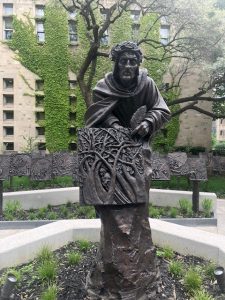
“The conference was a rich assortment of talks, from witchcraft and feminism in early Enlightenment Italy to Pope Francis’s use of St. Francis’s teachings to address the current environmental crisis, all ably organized by my friends Silvia Benso and Brian Schroeder, professors of philosophy at the Rochester Institute of Technology. My favorite talk was by the art historian Julian Haladyn about his visit to San Casciano to see Machiavelli’s home there. This raised some vigorous discussion about why we want to preserve the residences of famous people of the past, especially since in this case Machiavelli himself lived in the modest home only because he had been exiled from his native Florence, which he longed to return to. As seen in the quote above from the letter he wrote to his friend Francesco Vittori, Machiavelli felt great melancholy as he contemplated the life he once had had in his beloved place of birth, which he could almost glimpse from his place of banishment. So close and yet so far. He found solace in reading the works of ancient philosophers and writing his masterpiece The Prince while there but never gave up his desire to go back to his native city. To paraphrase Neil Diamond, Machiavelli might well have thought ‘San Casciano’s fine but it ain’t home, Florence is home but it ain’t mine no more.’
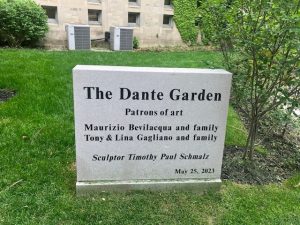
“Next to the campus building that houses the Department of Italian Studies, where the conference was held, was a newly-erected Dante Sculpture Garden, with a panel depicting each canto of the Divine Comedy. It was created by sculptor Timothy Schmalz, the same person who made the statue of St. Basil gracing the front of our Hermance Family Chapel of St. Basil theGreat. Coincidentally, the Garden was unveiled on May 25, less than two weeks before the conference (see Sculptor, cardinal tout Dante’s power (catholicregister.org)), which seemed very fitting. I encourage everyone to take the train to Toronto and see this magnificent tribute to one of Italy’s greatest writers. Dante also knew a thing or two about exile from Florence.”
Back in early July, Dr. Mark Rice and his wife, Anne, and traveled to Italy!

“It was our first time there, and it was a delayed (because of COVID) 30th wedding anniversary trip. We spent three days in Rome and five days in Florence. Florence was by far our favorite of the two. The sixth floor apartment we rented had a panoramic view of the city, so we could sip espresso on our balcony while looking out at the Duomo, listening to the morning church bells while swifts and swallows darted through the sky catching their first meals of the day. It was piercingly hot while we were there (you might have read about the heatwave that gripped southern Europe), but the city’s narrow streets made shade relatively easy to find. We visited many of the usual sites in both cities but the one I was most determined to see was Michelangelo’s statue of David. It was awesome (in the real sense of that word) and sublime to behold, a true masterpiece of the human spirit.
“Of course, the food needs to be talked about, too. I’m not usually one to suggest Italian when we go out to eat, but every meal we had was fantastic. Two standouts were a warm salad of grilled octopus, potato, black olives, and parsley in a light lemon dressing, and a grilled steak (medium rare) with a balsamic glaze, topped with a handful of arugula. Both went well with the wine we drank (and drank).
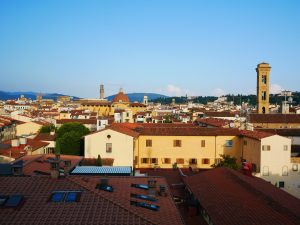
“Anne and I generally don’t like to revisit countries we’ve already been to because the world is too big and we want to explore as much of it as we can, but we’re already thinking about another trip to Italy—the Amalfi coast? Lake Como? Both?”
This summer,  Dr. Deb Vanderbilt headed to France with great company.
Dr. Deb Vanderbilt headed to France with great company.
“I went to France for 10 days in the company of my 2 sons who both are fluent in French, which made all my public transportation and restaurant experiences very relaxing. I saw a lot of cathedrals, but my favorite was St. Denis basilica in the suburbs of Paris. The church is amazing and the crypt is fascinating!”
 Professor Liga Kalnina took a trip of a lifetime to Norway!
Professor Liga Kalnina took a trip of a lifetime to Norway!
“This summer I went on a trip with the IFTA(International Tree Fruit Association) to Norway to learn more about the European apple production, visit orchards and tree fruit research centers as well as interact with apple growers from United States and around the world. This was once in a lifetime trip with the IFTA to visit the Fjords of Norway.
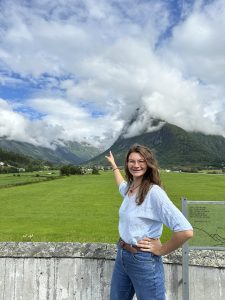
“I’m attaching a couple pictures. One is with the IFTA members and Professor Mekjell Meland visiting NIBIO Tree Fruit Research Center in Ullensvang, Norway and the other one is me in front of Europes largest glacier in the background pointing at the glacier as well as some picturesque apple orchards in Norway”

Last but not least, Professor Jeremy Sarachan ventured the furthest to the Middle East!
“In mid-July, I had the opportunity to travel to Israel as part of the Ramim program through the Jewish Federation of Rochester. This is an exchange program for twelve adults (35-55) to partner with counterparts in Modi’in. I was partnered with a Secular Rabbi (and former Air Force officer) and stayed in his home with his wife. 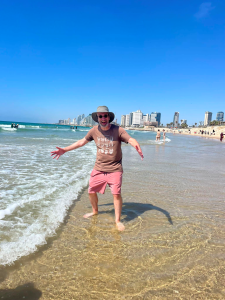 (The Israelis will visit Rochester in October.) The group explored sites in Jerusalem, Tel Aviv, and the area and towns around the Gaza Strip for several days of conversation, learning, and comradeship. I had the opportunity to visit the Wailing Wall, tour public art in Tel Aviv, learn about Ethiopian Jewry, and participate in a peace art project a few yards from the border with Gaza (just to name four of several dozen events over several days). On the last day, swimming in the Mediterranean Sea from a beach in Tel Aviv was in order. (This was necessary; daytime temperatures varied between 92 and 102 each day.)”
(The Israelis will visit Rochester in October.) The group explored sites in Jerusalem, Tel Aviv, and the area and towns around the Gaza Strip for several days of conversation, learning, and comradeship. I had the opportunity to visit the Wailing Wall, tour public art in Tel Aviv, learn about Ethiopian Jewry, and participate in a peace art project a few yards from the border with Gaza (just to name four of several dozen events over several days). On the last day, swimming in the Mediterranean Sea from a beach in Tel Aviv was in order. (This was necessary; daytime temperatures varied between 92 and 102 each day.)”




 Dr. Deb Vanderbilt headed to France with great company.
Dr. Deb Vanderbilt headed to France with great company. Professor Liga Kalnina took a trip of a lifetime to Norway!
Professor Liga Kalnina took a trip of a lifetime to Norway!




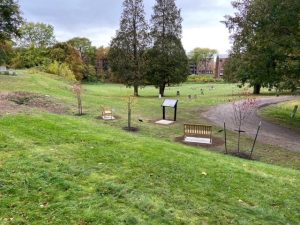 On October 23rd, 2023, a memorial honoring the unmarked
On October 23rd, 2023, a memorial honoring the unmarked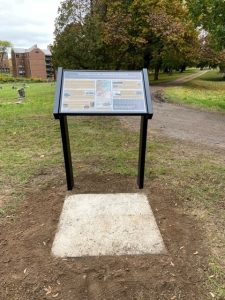 in the 1980s. Dr. Thibodeau learned of these graves back in 2020 when WXXI published a story about the unmarked graves, along with a brief glimpse of the history behind the gravesite. He also revealed the inspiration behind the memorial came from a documentary he saw in 2020 centered on the cemeteries at the former Athens Lunatic Asylum in Ohio to help identify and recognize those buried in Athens. For those interested, they can check out the documentary on
in the 1980s. Dr. Thibodeau learned of these graves back in 2020 when WXXI published a story about the unmarked graves, along with a brief glimpse of the history behind the gravesite. He also revealed the inspiration behind the memorial came from a documentary he saw in 2020 centered on the cemeteries at the former Athens Lunatic Asylum in Ohio to help identify and recognize those buried in Athens. For those interested, they can check out the documentary on 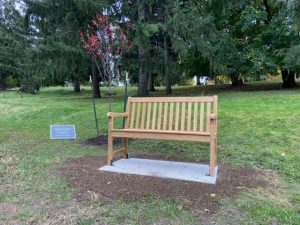
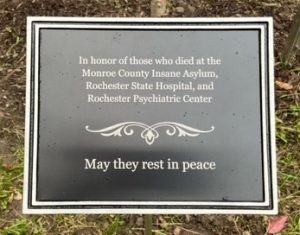 the first place – mental illness, poverty, and crime. What about our current policies are working? What isn’t working about them? Th
the first place – mental illness, poverty, and crime. What about our current policies are working? What isn’t working about them? Th